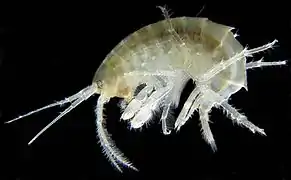Gammarus roeseli
Gammarus roeseli is a species of freshwater amphipod native to Europe. G. roeseli are a successful invasive species due to their high reproductive rate, tolerance to changing environmental conditions and unique anti-predation characteristics.
| Gammarus roeseli | |
|---|---|
 | |
| Scientific classification | |
| Kingdom: | |
| Phylum: | |
| Subphylum: | |
| Class: | |
| Order: | |
| Family: | |
| Genus: | |
| Species: | G. roeseli |
| Binomial name | |
| Gammarus roeseli | |
| Synonyms | |
|
Gammarus roeselii (lapsus) | |
Distribution
Gammarus roeseli are found in freshwater environments such as ponds, oxbow lakes and small streams. Populations tend to be highest in rivers with moderate water flow and ample plants to be used as shelter. G. roeseli originated in the Balkan area of Europe, but increased the distribution area to into Northern Italy. Populations can even be found in the sub-lacustrine area known as Ticino, which is the furthest region from it origin that this species has invaded thus far. G. roeseli's mechanism of invasion is still unknown but it is most likely due to human activities such as aquaculture or fish repopulation. G. roeseli were once used as a food source in commercial fisheries, so it is possible that some individuals escaped and were able to populate new areas. G. roeseli are a successful invasive species due to their high reproductive rate, tolerance to changing environmental conditions and unique anti-predation characteristics. G. roeseli have the ability to easily attach their bodies to substrates by using the spines on its metasomes. These organisms are also able to survive out of water for several days at a time, making the transfer of G. roeseli feasible over land.
